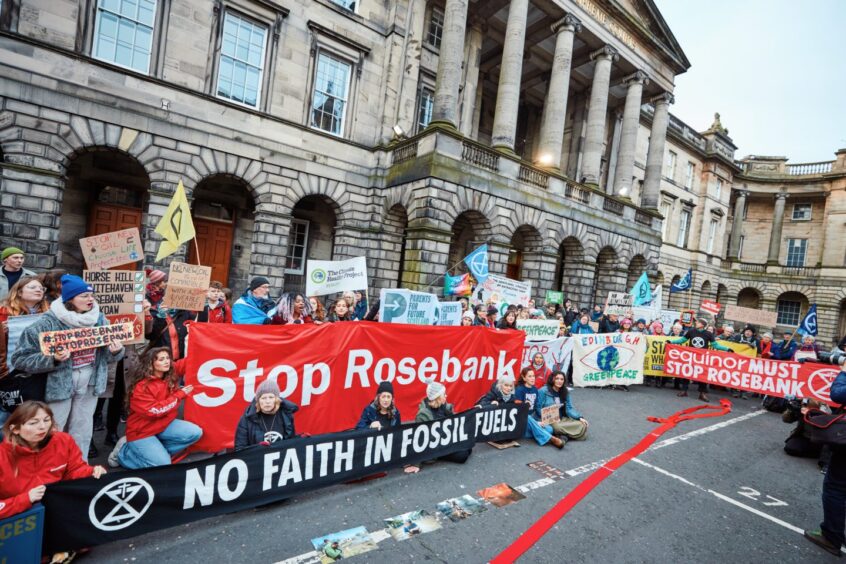
A landmark hearing concluded Friday that will decide the future of Rosebank, the UK’s largest undeveloped oil field.
Rosebank, with approximately 300-500 million barrels of oil equivalent, is the subject of a judicial review brought jointly by the environment groups Greenpeace and Uplift which is being heard at the Court of Session in Edinburgh.
Its operator Equinor (OSLO:EQNR), and project partner Ithaca (LON: ITH), was joined by Shell (LON:SHEL) in the legal action over approval awarded to its North Sea Jackdaw gas field.
Equinor’s legal representative argued in the Court of Session that withdrawing the licence for Rosebank would lead to delays and the loss of up to 4,000 jobs.
The Norwegian energy firm’s legal representatives added that “any pause at all means years of delay”, according to reports.
The impact of delaying the Jackdaw project by a year would cost at least £200 million, Shell’s legal representative said in court.
Ewan Gibbs, a senior lecturer in economic and social history at the University of Glasgow, told Energy Voice that including scope 3 emissions was “pivotal” but the effect on jobs was “emotive”.
“Considering Scope 3 emissions is pivotal I think in shifting the understanding of what is at stake in the development of an oil and gas field towards their meaningful contribution to carbon emissions.
“Since COP26 we’ve certainly seen currents in British politics who similarly wish to push back against climate commitments, often citing costs in terms of energy security, economic benefits or jobs.”
He added it is “jobs which have been the most emotive factor, particularly in the north and north-east of Scotland”.
“Whilst those commitments are not up for debate in court today, they will shape the political context and therefore be part of the response of the UK government, and the position taken by the Scottish government too.”
The Rosebank project was approved in September 2023, a year after Shell’s Jackdaw gas project.
Rosebank was granted planning consent by the oil and gas authority the North Sea Transition Authority (NSTA) after being approved by the Department for Energy Security and Net Zero’s arm, the Offshore Petroleum Regulator for Environment and Decommissioning (OPRED), in 2023.
Campaign groups Greenpeace and Uplift each challenged the decision to approve the Rosebank project on the basis of downstream emissions.
Greenpeace also launched a separate challenge against Shell’s Jackdaw development.
Green groups refute economic arguments
Equinor has argued the Rosebank project has the potential to add £6.3bn to the UK economy.
Uplift has refuted claims that the project would boost the economy, stating that the only way to reduce customer energy bills is building more renewable energy and insulating homes.
Precedent
Environmental lawyer Tessa Khan from Uplift told Energy Voice that “the government has to abide by what the legal requirement requires”.
She said that whether campaigners would appeal any ruling would “depend” on what the final decision says three months from now.
The campaigners’ efforts have been strengthened following a previous landmark ruling by the United Kingdom’s Supreme Court this summer, which prompted the UK government to drop its opposition in other cases.
The case in June ruled against plans to develop an oil field near Gatwick Airport, effectively revoking the licence issued for the Horse Hill project by Surrey Council in what became known as the Finch ruling.
The UK government accepted that the council’s decision to grant planning permission for the oil development was “unlawful” because end-use atmospheric emissions from burning extracted oil “were not assessed” in the environmental impact assessment.
Khan argued that a separate case against Shell in the Dutch courts will have no bearing on the Rosebank and Jackdaw decisions.
On Monday, an appeal court in the Hague overturned a ruling for Shell to cut emissions across its value chain, including downstream emissions produced by its customers.
“Our case is about the UK government,” she said, whereas the Dutch case concerned a company.
Khan said that when the UK government conducted its environmental impact assessment of Rosebank it “failed to take into consideration CO2 emissions by burning reserves in field”.
Uplift argues that the Rosebank project represents emissions equivalent to 56 coal plants a year, that the Supreme Court has decided it was unlawful to approve a separate fossil fuel project, and that the UK government conceded the decision was made unlawfully.
The group also argues that the NSTA failed to publish its reasons for approving Rosebank, and that a marine gas pipeline does not take into account Scotland’s marine plan.
The hearing of the case began on 12 November in the Scottish courts, with a decision due to be announced within three months of the hearing.
If the cases against Rosebank and Jackdaw are upheld, the permissions for development would be withdrawn and the companies would likely have to carry out new environmental assessments to encompass end-use emissions.
A Shell spokesperson said: “From the outset, Jackdaw has been developed in line with all relevant consents and permits. We accept the Supreme Court’s ruling in the Finch case, but our position is that Jackdaw is a vital project for UK energy security and the project is already well advanced.
“Stopping the work is a highly complex process, with significant technical and operational issues now that infrastructure is in place and drilling has started in the North Sea.
“Jackdaw will provide enough fuel to heat 1.4 million UK homes as older gas fields reach the end of production.”
Equinor and its partner in the Rosebank field, Ithaca Energy, have been approached for comment.

